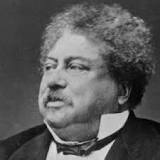The Count of Monte Cristo Page #11
The Count of Monte Cristo is an adventure novel by French author Alexandre Dumas completed in 1844. It is one of the author's most popular works, along with The Three Musketeers.
Lovely as the Greek girls of Cyprus or Chios, Mercédès boasted the same bright flashing eyes of jet, and ripe, round, coral lips. She moved with the light, free step of an Arlesienne or an Andalusian. One more practiced in the arts of great cities would have hid her blushes beneath a veil, or, at least, have cast down her thickly fringed lashes, so as to have concealed the liquid lustre of her animated eyes; but, on the contrary, the delighted girl looked around her with a smile that seemed to say: “If you are my friends, rejoice with me, for I am very happy.” As soon as the bridal party came in sight of La Réserve, M. Morrel descended and came forth to meet it, followed by the soldiers and sailors there assembled, to whom he had repeated the promise already given, that Dantès should be the successor to the late Captain Leclere. Edmond, at the approach of his patron, respectfully placed the arm of his affianced bride within that of M. Morrel, who, forthwith conducting her up the flight of wooden steps leading to the chamber in which the feast was prepared, was gayly followed by the guests, beneath whose heavy tread the slight structure creaked and groaned for the space of several minutes. “Father,” said Mercédès, stopping when she had reached the centre of the table, “sit, I pray you, on my right hand; on my left I will place him who has ever been as a brother to me,” pointing with a soft and gentle smile to Fernand; but her words and look seemed to inflict the direst torture on him, for his lips became ghastly pale, and even beneath the dark hue of his complexion the blood might be seen retreating as though some sudden pang drove it back to the heart. During this time, Dantès, at the opposite side of the table, had been occupied in similarly placing his most honored guests. M. Morrel was seated at his right hand, Danglars at his left; while, at a sign from Edmond, the rest of the company ranged themselves as they found it most agreeable. Then they began to pass around the dusky, piquant, Arlesian sausages, and lobsters in their dazzling red cuirasses, prawns of large size and brilliant color, the echinus with its prickly outside and dainty morsel within, the clovis, esteemed by the epicures of the South as more than rivalling the exquisite flavor of the oyster, North. All the delicacies, in fact, that are cast up by the wash of waters on the sandy beach, and styled by the grateful fishermen “fruits of the sea.” “A pretty silence truly!” said the old father of the bridegroom, as he carried to his lips a glass of wine of the hue and brightness of the topaz, and which had just been placed before Mercédès herself. “Now, would anybody think that this room contained a happy, merry party, who desire nothing better than to laugh and dance the hours away?” “Ah,” sighed Caderousse, “a man cannot always feel happy because he is about to be married.” “The truth is,” replied Dantès, “that I am too happy for noisy mirth; if that is what you meant by your observation, my worthy friend, you are right; joy takes a strange effect at times, it seems to oppress us almost the same as sorrow.” Danglars looked towards Fernand, whose excitable nature received and betrayed each fresh impression. “Why, what ails you?” asked he of Edmond. “Do you fear any approaching evil? I should say that you were the happiest man alive at this instant.” “And that is the very thing that alarms me,” returned Dantès. “Man does not appear to me to be intended to enjoy felicity so unmixed; happiness is like the enchanted palaces we read of in our childhood, where fierce, fiery dragons defend the entrance and approach; and monsters of all shapes and kinds, requiring to be overcome ere victory is ours. I own that I am lost in wonder to find myself promoted to an honor of which I feel myself unworthy—that of being the husband of Mercédès.” “Nay, nay!” cried Caderousse, smiling, “you have not attained that honor yet. Mercédès is not yet your wife. Just assume the tone and manner of a husband, and see how she will remind you that your hour is not yet come!” The bride blushed, while Fernand, restless and uneasy, seemed to start at every fresh sound, and from time to time wiped away the large drops of perspiration that gathered on his brow. “Well, never mind that, neighbor Caderousse; it is not worthwhile to contradict me for such a trifle as that. ’Tis true that Mercédès is not actually my wife; but,” added he, drawing out his watch, “in an hour and a half she will be.” A general exclamation of surprise ran round the table, with the exception of the elder Dantès, whose laugh displayed the still perfect beauty of his large white teeth. Mercédès looked pleased and gratified, while Fernand grasped the handle of his knife with a convulsive clutch. “In an hour?” inquired Danglars, turning pale. “How is that, my friend?” “Why, thus it is,” replied Dantès. “Thanks to the influence of M. Morrel, to whom, next to my father, I owe every blessing I enjoy, every difficulty has been removed. We have purchased permission to waive the usual delay; and at half-past two o’clock the Mayor of Marseilles will be waiting for us at the city hall. Now, as a quarter-past one has already struck, I do not consider I have asserted too much in saying, that, in another hour and thirty minutes Mercédès will have become Madame Dantès.” 0069m Fernand closed his eyes, a burning sensation passed across his brow, and he was compelled to support himself by the table to prevent his falling from his chair; but in spite of all his efforts, he could not refrain from uttering a deep groan, which, however, was lost amid the noisy felicitations of the company. “Upon my word,” cried the old man, “you make short work of this kind of affair. Arrived here only yesterday morning, and married today at three o’clock! Commend me to a sailor for going the quick way to work!” “But,” asked Danglars, in a timid tone, “how did you manage about the other formalities—the contract—the settlement?” “The contract,” answered Dantès, laughingly, “it didn’t take long to fix that. Mercédès has no fortune; I have none to settle on her. So, you see, our papers were quickly written out, and certainly do not come very expensive.” This joke elicited a fresh burst of applause. “So that what we presumed to be merely the betrothal feast turns out to be the actual wedding dinner!” said Danglars. “No, no,” answered Dantès; “don’t imagine I am going to put you off in that shabby manner. Tomorrow morning I start for Paris; four days to go, and the same to return, with one day to discharge the commission entrusted to me, is all the time I shall be absent. I shall be back here by the first of March, and on the second I give my real marriage feast.” This prospect of fresh festivity redoubled the hilarity of the guests to such a degree, that the elder Dantès, who, at the commencement of the repast, had commented upon the silence that prevailed, now found it difficult, amid the general din of voices, to obtain a moment’s tranquillity in which to drink to the health and prosperity of the bride and bridegroom.
Translation
Translate and read this book in other languages:
Select another language:
- - Select -
- 简体中文 (Chinese - Simplified)
- 繁體中文 (Chinese - Traditional)
- Español (Spanish)
- Esperanto (Esperanto)
- 日本語 (Japanese)
- Português (Portuguese)
- Deutsch (German)
- العربية (Arabic)
- Français (French)
- Русский (Russian)
- ಕನ್ನಡ (Kannada)
- 한국어 (Korean)
- עברית (Hebrew)
- Gaeilge (Irish)
- Українська (Ukrainian)
- اردو (Urdu)
- Magyar (Hungarian)
- मानक हिन्दी (Hindi)
- Indonesia (Indonesian)
- Italiano (Italian)
- தமிழ் (Tamil)
- Türkçe (Turkish)
- తెలుగు (Telugu)
- ภาษาไทย (Thai)
- Tiếng Việt (Vietnamese)
- Čeština (Czech)
- Polski (Polish)
- Bahasa Indonesia (Indonesian)
- Românește (Romanian)
- Nederlands (Dutch)
- Ελληνικά (Greek)
- Latinum (Latin)
- Svenska (Swedish)
- Dansk (Danish)
- Suomi (Finnish)
- فارسی (Persian)
- ייִדיש (Yiddish)
- հայերեն (Armenian)
- Norsk (Norwegian)
- English (English)
Citation
Use the citation below to add this book to your bibliography:
Style:MLAChicagoAPA
"The Count of Monte Cristo Books." Literature.com. STANDS4 LLC, 2024. Web. 25 Nov. 2024. <https://www.literature.com/book/the_count_of_monte_cristo_34>.




Discuss this The Count of Monte Cristo book with the community:
Report Comment
We're doing our best to make sure our content is useful, accurate and safe.
If by any chance you spot an inappropriate comment while navigating through our website please use this form to let us know, and we'll take care of it shortly.
Attachment
You need to be logged in to favorite.
Log In